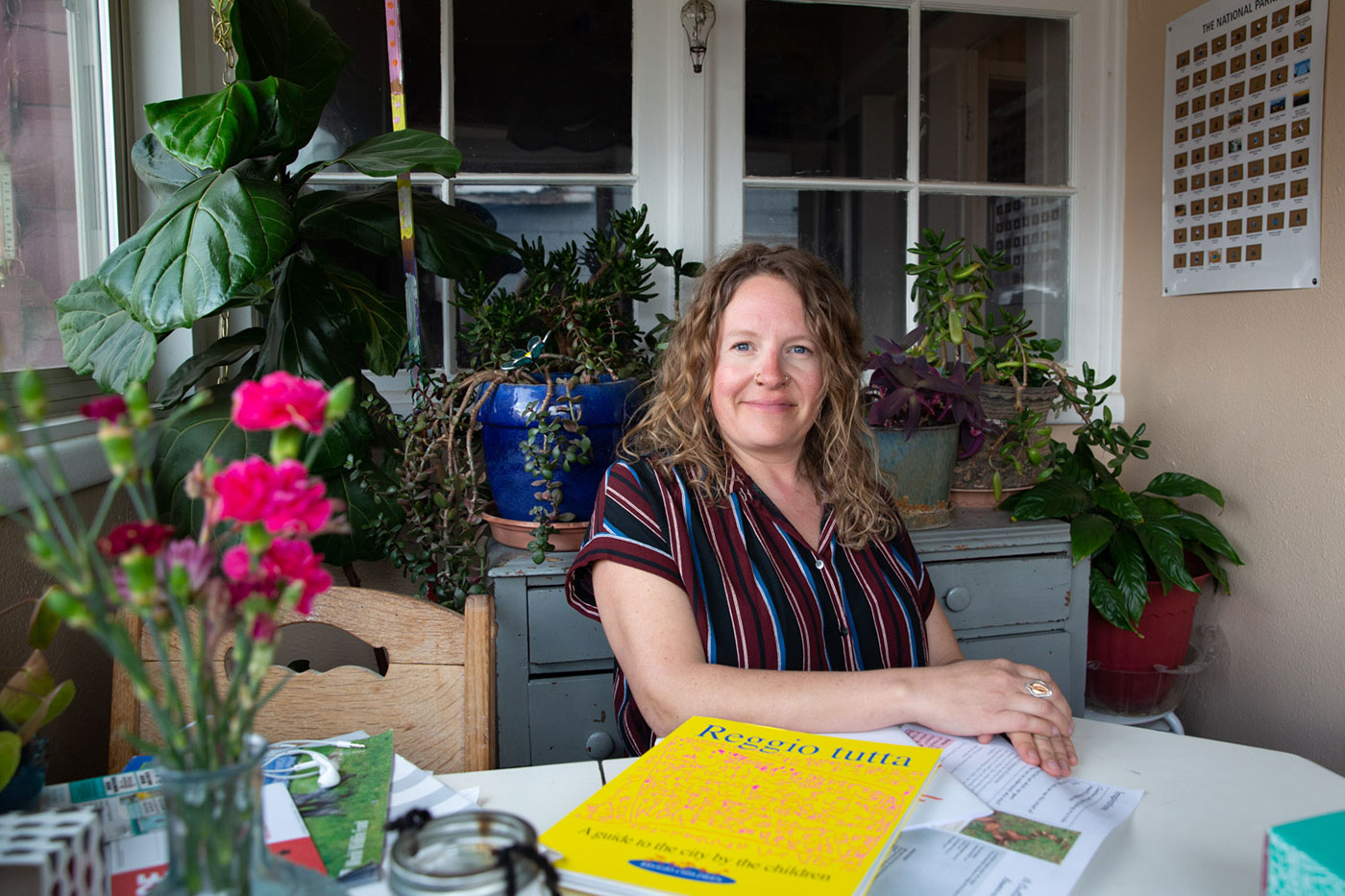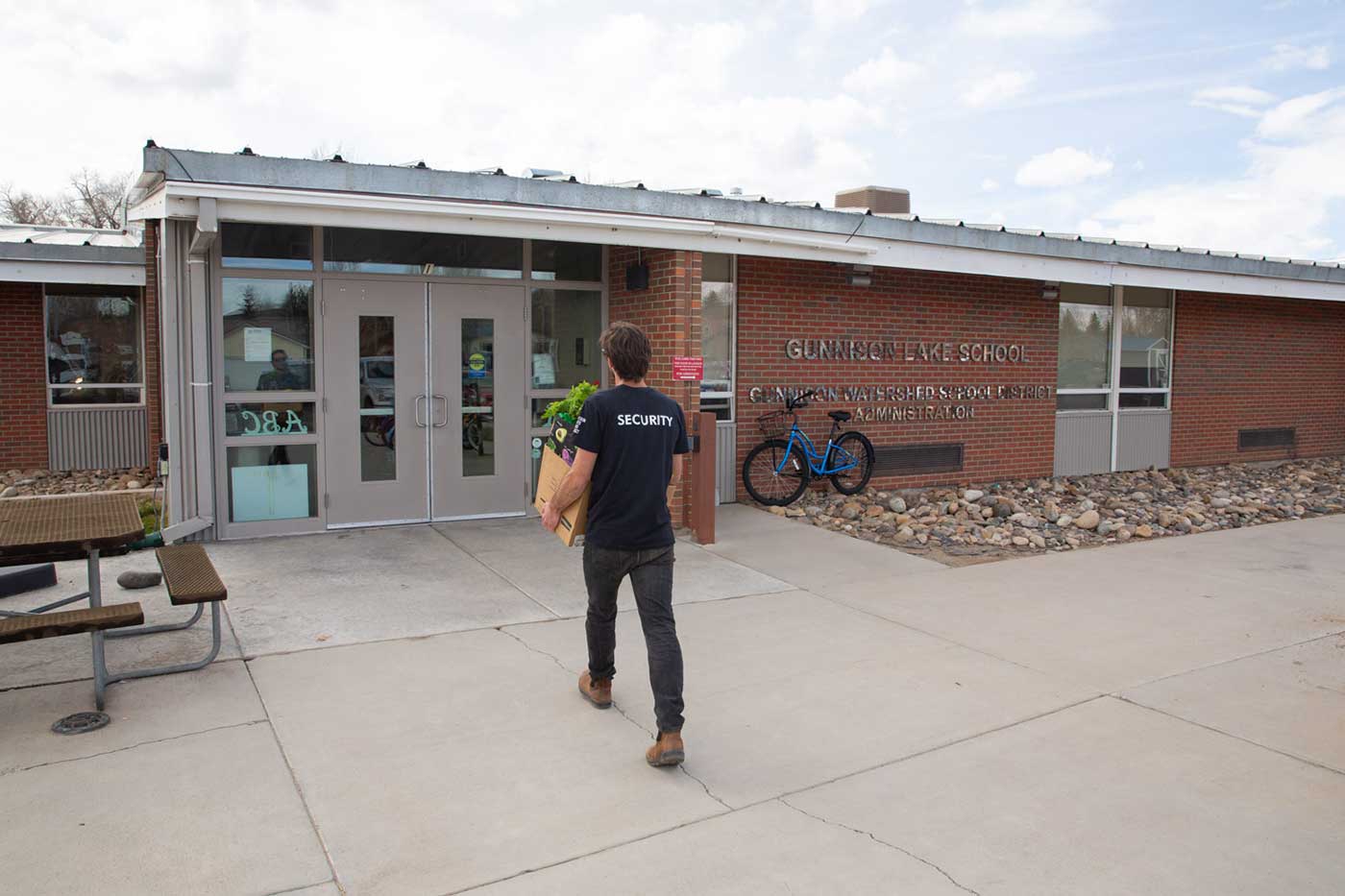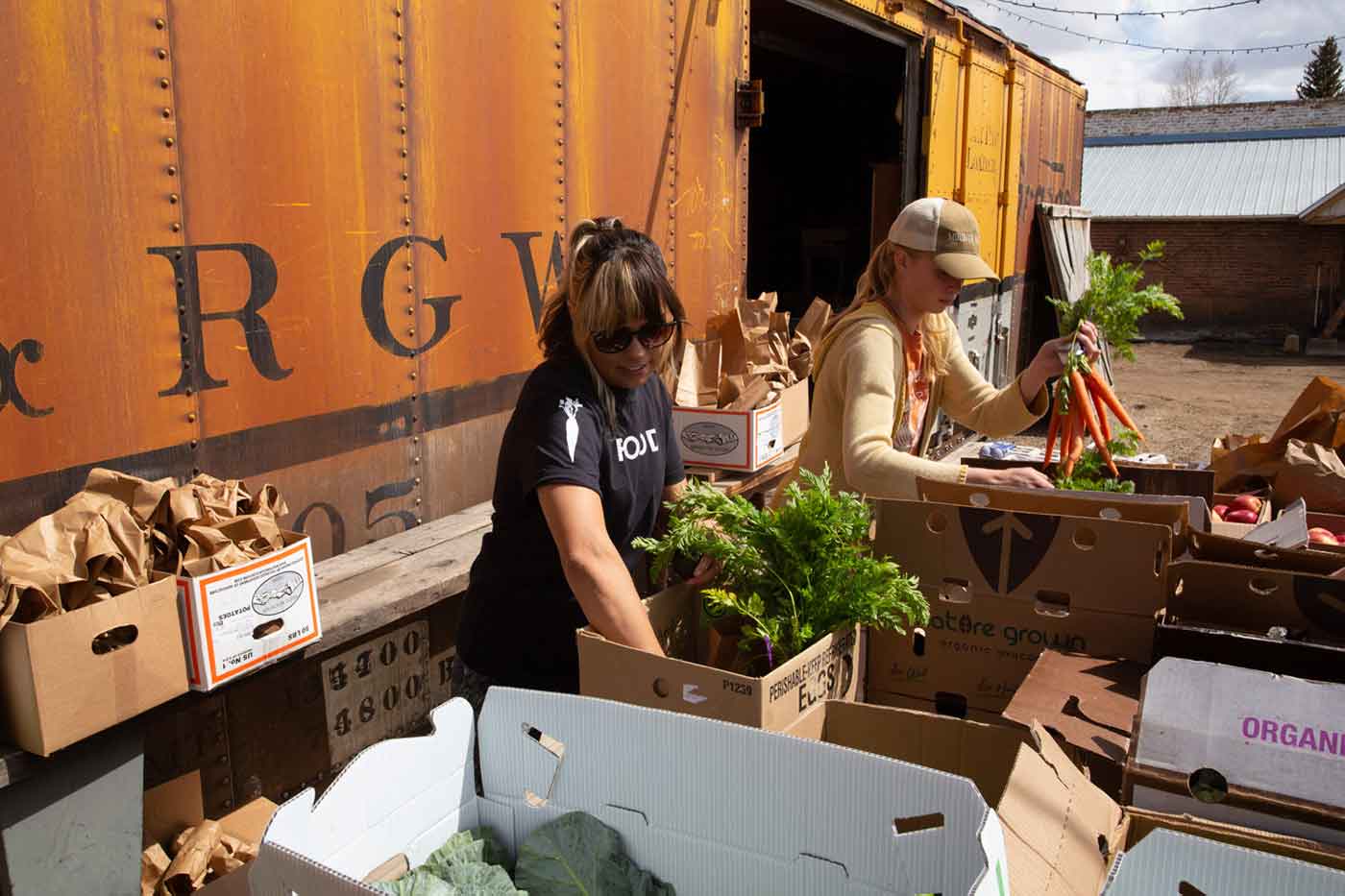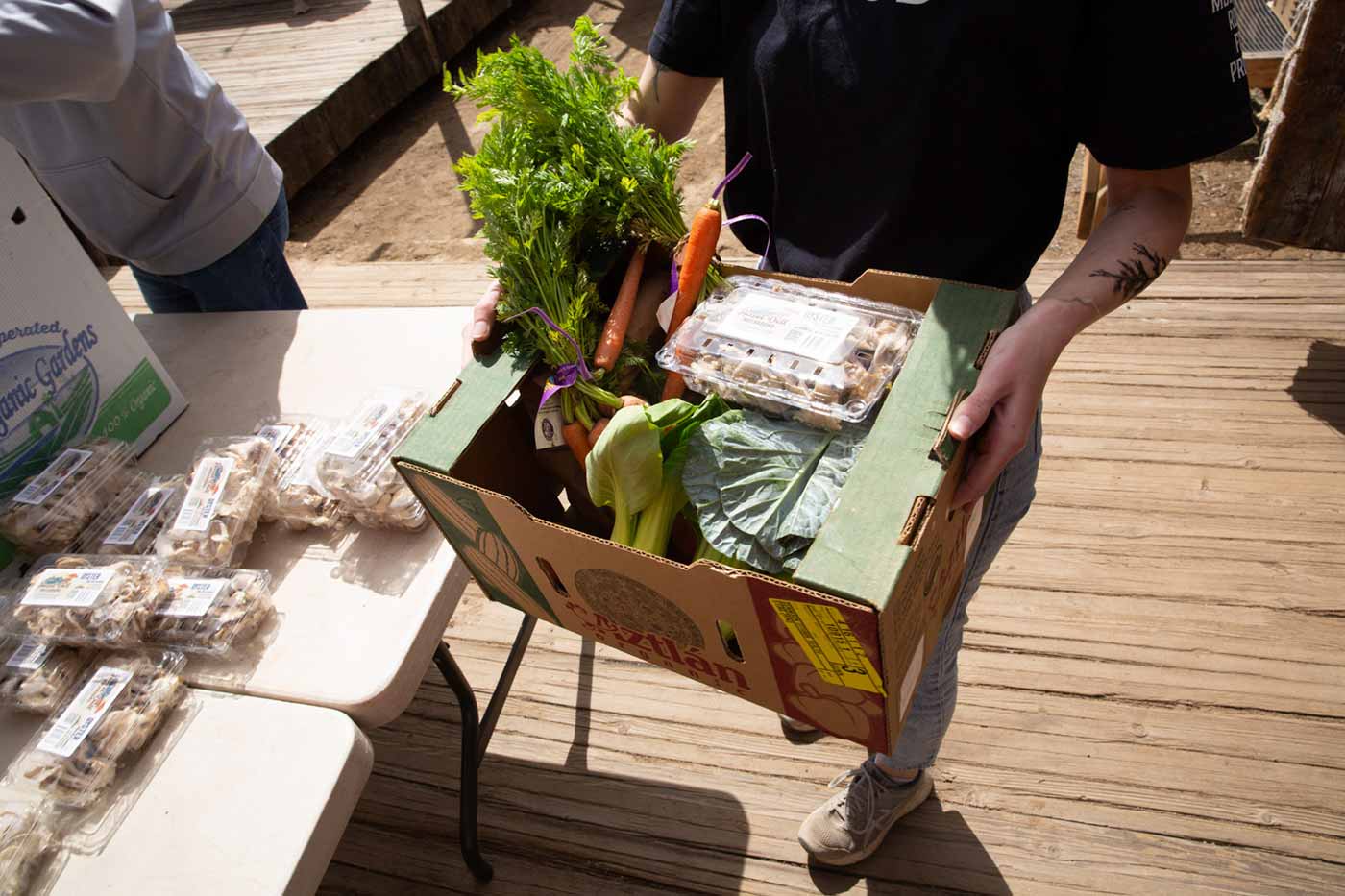
Amanda Birdsong at her preschool in Gunnison, Colo. Photos by Luna Anna Archey / Special to The Colorado Trust
Amanda Birdsong at her preschool in Gunnison, Colo. Photos by Luna Anna Archey / Special to The Colorado Trust
Once a month, Amanda Birdsong opens her front door in the afternoon to find a box of fresh produce. Birdsong operates Songbird School House, a family child care home in Gunnison for children between one and five years old.
The produce boxes have been a boon to Birdsong’s family. She’s able to feed her own two children fresh produce (which is often out of stock at the nearby market) and local meat (generally too expensive at the store), and she relishes the ease of having the groceries dropped right at her door.
The food cartons are a collaboration between the Gunnison-Hinsdale Early Childhood Council (ECC) and Mountain Roots Food Project, a Gunnison-area food systems nonprofit, to provide healthy food to area teachers for free. (Mountain Roots is a past Colorado Trust grantee.)
“Early childhood teachers play such a critical role in the overall functioning of our community and supporting the development of young children, but they’re often forgotten in their roles,” said Lana Athey, the council’s early childhood services supervisor. The workforce is experiencing high levels of burnout and stress after more than two years of upended learning from the COVID-19 pandemic, and the council realized that food was an ongoing cost burden they could help lower.
“If we could provide food for our teachers,” Athey said, “it could free up funds in that household for other things.”
Colorado teachers could certainly use additional financial support: The state’s educator salaries are among the lowest in the country.
“Preschool educator salaries aren’t what they should be, so while they aren’t living at the poverty level, their budgets are still quite tight,” explained Holly Conn, Mountain Roots’ executive director. “Providing fresh, healthy food for teachers feels supportive, it provides a benefit—it says, ‘We (the council, and perhaps the owners of the preschools) care about your well-being and we want to invest in it,’ whether or not they identify as food insecure.”
Food insecurity continues to be a concern across the state and appears to be worse now than at the start of the pandemic. According to Hunger Free Colorado, one in three Coloradans is food insecure. Data provided by the Gunnison County Food Pantry shows that nearly 25% of area households have applied for the Supplemental Nutrition Assistance Program (SNAP) since 2019 and 35% of residents qualify for help from the pantry.
“In 2022, less people used the pantry than 2021, but those people came more often,” said Jodi Payne, the food pantry’s executive director. “Households who historically visited us once a month started coming two to three times a month.”
Whether they identify as food insecure or not, low pay can leave Colorado teachers struggling to pay bills or afford healthy foods. That can impact their ability to do their jobs—and their decisions to continue in the profession.

Peyton Foley, food security director for Mountain Roots, delivers food boxes to Gunnison elementary school teachers as part of Mountain Roots’ work in the region.
“Teachers, now more than ever, are experiencing higher workloads, inadequate pay and limited time in addition to increased experiences of grief, loss and economic hardship. These stresses can impact their relationships with the children and families they work with,” Conn said. “Mountain Roots wants to help remove barriers that preschool teachers might have in accessing fresh, healthy food, so that they are more likely to eat well at home, keeping themselves happier and healthier.”
Since October, Mountain Roots employees and volunteers have packaged and delivered their food boxes to more than 80 early childhood educators across Gunnison and Hinsdale counties. The monthly offerings vary by what’s available, but generally they’re chock full of seasonal produce, eggs, a protein and breads from local and regional producers like Gunnison Gardens, Calder Farm and D3+ Eggs.
“They’ve just been wonderful for a lot of reasons… . It’s provided some things when there’s been food shortages, like the eggs,” Birdsong said. “It helps you see your food as a more precious and celebratory thing than just, ‘I’ve got to feed people with whatever’s handy.’ … [It’s] something that brings joy.”
She added: “It really is a very literal help.”
* * *
Most food insecurity programs connected with schools, like the state’s Farm to Child initiative under its Healthy Eating Active Living program, are dedicated to improving student nutrition and food access. Those benefits can carry over to educators, who sometimes get to take home extra food. But initiatives aimed specifically at teachers are scarce—and needed now more than ever.
Even before the pandemic, teachers were experiencing higher levels of food insecurity than the general population, said Shreela V. Sharma, PhD, RDN, a professor of epidemiology at the UTHealth Houston School of Public Health. A study published at the end of 2020 found that early care and education teachers were facing the highest rates of food insecurity measured to date, with nearly half of them experiencing food insecurity over the previous 12 months.
“Many times, our teachers will tell us, ‘I had to cut down on my groceries because I needed to pay the rent,’ or ‘the utilities have gone up,’” Sharma said. “You go into this self-perpetuating cycle of, you’re food insecure so you’re buying unhealthy food, perhaps, or engaging in disordered eating patterns because you’re eating when you can—and that then increases your risk for health conditions like diabetes and hypertension, and now you’re spending money to manage those health conditions.”
Sharma is also the co-founder of Brighter Bites, a nonprofit, school-based food co-op that distributes biweekly bags of fresh fruits and vegetables to families and teachers at institutions in 10 cities across five states. (The organization provides nutrition education as well.) Last year, the group served more than 50,000 primarily low-income families; approximately 8%, or 4,500, were teachers.
UTHealth and Brighter Bites have conducted an educator survey for the past three years to evaluate the impact of COVID-19 on workforce health. Over that period, Sharma said, “We’ve consistently found over one-third of the teachers are reporting that they are struggling with food insecurity.” While Colorado wasn’t included in the data, the results tell Sharma that food insecurity is “a consistent, pervasive issue” that crosses the urban-rural divide.
In the same survey, more than one-third of teachers also self-reported poor health and well-being, and more than 60% said they were experiencing elevated levels of stress. A separate, pre-pandemic survey out of San Francisco found that teachers were experiencing higher levels of economic anxiety compared to the national average. All of that can affect their ability to provide a quality education.
“Many of our educators are impacted through their proximity to food access. They have minimal times to access food and resources outside of working hours… [and] financial barriers to purchasing quality food,” said Britt Martens, the Farm to Colorado specialist for the Colorado Department of Public Health & Environment.
Shifting some food access projects to educators is an “equitable approach” and one that helps model healthy eating to children, Martens said. “It’s making sure educators are supported so they can stay in their roles.”

Blaise Jaros, food security team and Americorps member, and Grace Longendyke, farm-to-school educator and Americorps member, pack food boxes to deliver to Gunnison-area educators.
A small number of efforts to address this persistent issue have popped up elsewhere in Colorado. Weld County Health Department, for example, last year began providing boxes of food directly to child care and Spanish-speaking friend, family and neighbor providers (a term for care provided by unlicensed relatives or other community members, usually in a home setting). In La Plata County, which encompasses Durango, a nonprofit called The Good Food Collective has partnered with the state and the La Plata Food Equity Coalition to connect a handful of early childhood education providers with food resources like subsidized community-supported agriculture box deliveries. And Denver South High School’s Giving Grocery pantry is open to staffers, too.
But a patchwork collection of local efforts and food box deliveries aren’t likely to address what is now a statewide affordability issue for educators, and broader, long-term solutions are limited. For example, starting with the 2022 tax year, Colorado is offering a tax credit for eligible early childhood educators. Districts such as Cherry Creek Schools and Westminster Public Schools have announced pay raises. At the federal level, the proposed American Teacher Act would set minimum school-teacher salary requirements. In the meantime, some early childhood and early career educators are earning barely enough to get by.
* * *
Gunnison teacher Birdsong doesn’t consider herself food insecure, but over the course of her decade-plus career, she said many of her colleagues have been on the edge of food scarcity, and some of the families she serves are, too. For some educators, it’s an ongoing balancing act between the month-to-month bills and food.
Mountain Roots’ food boxes have, on average, $50 to $60 worth of groceries in them. Each one costs the nonprofit $10 to produce (covering staff time, storage space, the boxes and bags themselves, delivery vehicles and drivers, and administration).
“When you’re [living] paycheck to paycheck with your teacher salary, $50 to $100 does go a long way,” said Rachel, a former teacher who now works as a bilingual food assistance navigator at Hunger Free Colorado. (She requested to only use her first name for privacy.) “I think it’s important for people to realize the crisis is such that even that does help—even just that amount.”
The monthly boxes also have ancillary benefits: Both kids and educators are learning about new-to-them vegetables, like bok choy and lion’s mane mushrooms. And regional farmers receive financial support during a traditionally slow time of year, as Mountain Roots pays them directly for the food. The nonprofit also helps the farmers’ bottom lines by buying in odd quantities that could otherwise go to waste; for example, a restaurant won’t necessarily want to spring for 18 heads of cauliflower, but Mountain Roots can use it.

A typical food box that Mountain Roots delivers to educators includes fresh produce, a protein and bread.
But these boxes are only a short-term perk. The program is funded through a statewide grant program created by the state legislature in 2021, and the dollars run out in May. The council is looking at options to maintain the program, and Mountain Roots is on board if it is able to proceed. Both organizations want to see the initiative expand to other communities and employers, like K-12 schools and hospitals.
“Systems changes in the educational arena take a long time,” Mountain Roots Executive Director Conn said. “We’d like to be able to continue to serve early childhood educators as long as the need persists and as long as they see a tangible, positive benefit.”
The Gunnison-Hinsdale Early Childhood Council is planning to complete a survey with teachers to evaluate the program, but Athey, its early childhood services supervisor, has already received positive feedback anecdotally. Educators have enjoyed the quality of the food and the convenience, which has saved some of them from driving 30 minutes or more to a large supermarket.
According to Athey, “one site director said that it was the happiest she had ever seen her staff when the boxes came the first time.”